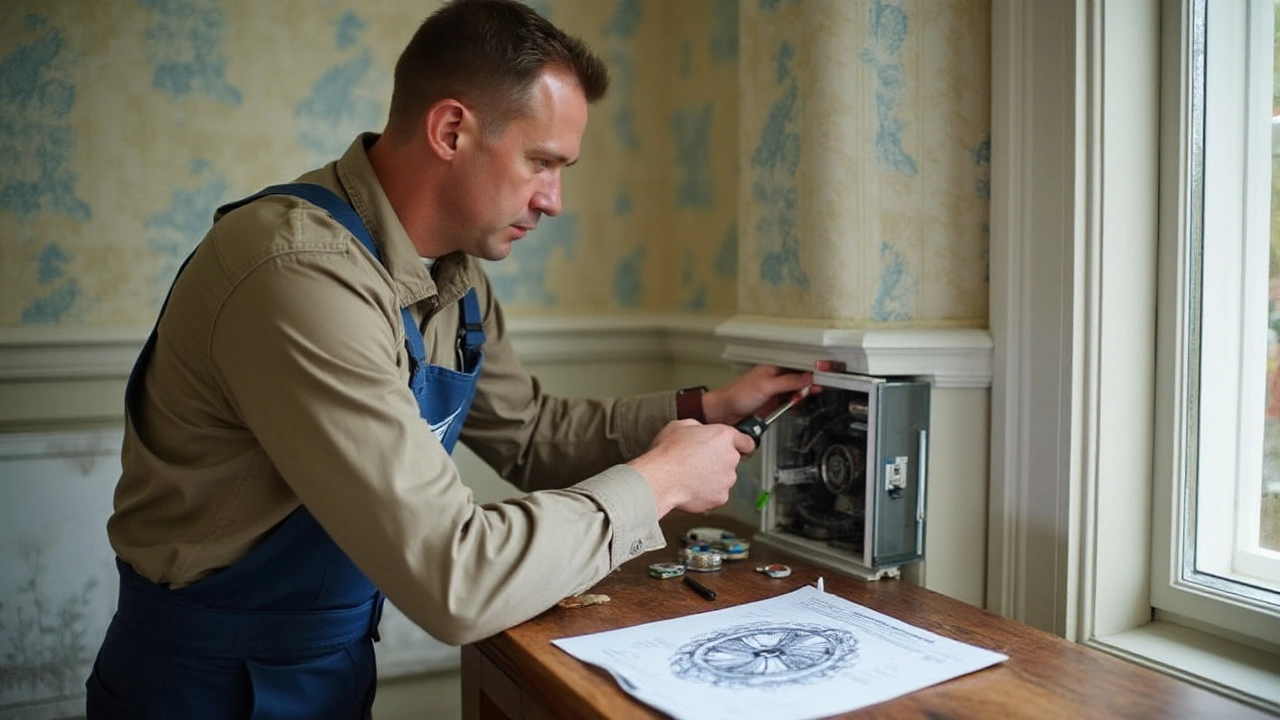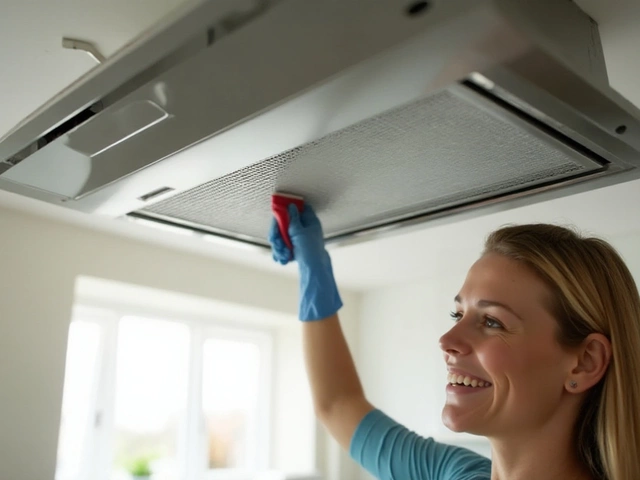Extractor fans are silent heroes within the walls of our homes. From banishing steam during a long, hot shower to whisking away cooking odors after preparing a family meal, they are essential in maintaining air quality and ensuring ventilation. But like any hardworking appliance, they benefit from a little attention and care over time.
You might not often think about it, but your trusty fan has quite a demanding role. Without regular servicing, an extractor fan can become less efficient and eventually malfunction, impacting the overall air quality of your home. To prevent this, understanding when and how to service your extractor fan is key.
If you're unsure whether you need to call in a professional or roll up your sleeves for some DIY maintenance, this guide will help point you in the right direction. Through a few simple tips and some basic know-how, you can keep your fan running smoothly and enjoy the benefits of fresh, clean air year-round.
- Importance of Regular Servicing
- Signs Your Extractor Fan Needs Servicing
- DIY Maintenance Tips
- When to Call a Professional
- Benefits of a Well-Maintained Extractor Fan
Importance of Regular Servicing
It often slips our minds that our household appliances, those seemingly steadfast companions, whisper their needs through the thin veil of daily wear and tear. The humility of an extractor fan is in its silent operation – whisking away steam and odors effortlessly – yet its efficient functioning depends heavily on regular servicing. Preventive maintenance can be a game-changer here, ensuring not just longevity but also optimal performance. Over time, dust, grease, and other particulates build up within the fan’s components, leading to decreased efficiency and increased energy consumption.
Just imagine cooking a hearty meal and that comforting smell lingering longer than desired because your kitchen fan is struggling. A simple inspection and cleaning every few months can save you from such aggravation. Industry experts often recommend servicing once or twice a year, but the frequency can vary based on usage and environmental conditions. For instance, homes near busy streets or with many cooking activities might need more frequent checks. A clean, smooth-running fan not only ensures better air quality but also reduces allergens and moisture buildup that can lead to mold. As energy conservation grows important, keeping such devices in peak condition translates to tangible savings on those energy bills, a win-win for both homeowners and the environment.
"The secret of extending the life of any appliance is in routine care and attention," an HVAC specialist once shared at a home improvement seminar I attended. This wisdom resonates deeply with the ethos of maintaining an ideal living space.
Regular servicing also acts as a preventive measure against sudden breakdowns during critical times, like losing your much-needed fan during a summer heatwave. Such breakdowns are not just inconvenient; they can rack up costs faster than anticipated when emergency service calls or replacements are needed. Trained technicians, during routine checks, can identify wear in parts that aren’t apparent to the untrained eye. Replacing or repairing these worn components during service is much more economical than addressing a problem post-failure.
Consider adopting a habit of maintaining a log detailing service dates and any noticeable issues. This simple act can be invaluable when discussing warranty claims or planning for replacements. It also allows service personnel to track recurring issues more accurately, making subsequent visits quicker and often cheaper. It's worth noting that many modern extractor fans come with features indicating when maintenance is required, like LED indicators or smart app notifications. Leveraging these features not only facilitates proper care but integrates seamlessly into our increasingly connected lives.
In summary, regular servicing of your home ventilation systems is more than just a means to prevent malfunction. It contributes to a more energy-efficient household, potentially lower utility bills, and a cleaner, healthier living environment. It's an investment in peace of mind, allowing you to enjoy the comforts of your home sans the worry of sudden appliance failures.
Signs Your Extractor Fan Needs Servicing
Extractor fans, whether nestled in your kitchen or bathroom, perform tirelessly every day. Over time, they may signal that they need servicing through a variety of signs that are easy to miss if you're not paying attention. Here, we'll explore those subtle hints that your extractor fan might give off when it's due for some TLC. Recognizing these signs early can prevent bigger issues down the line and ensure your fan continues to function effectively, contributing to good air quality in your home.
One of the first things you might notice is a drop in performance. If your fan's getting louder, or perhaps unusually quiet, it's sounding an alarm bell. Fans accumulate dust and grime over time, which can block components and make the motor work harder, resulting in these unusual sounds. A fan that's struggling might also stop removing steam or smoke effectively, leading to an increase in condensation on your walls, or even creating a stuffy atmosphere. Such a situation not only causes discomfort but can also lead to mold growth, which poses health risks. Pay close attention to any odd sounds or changes in your fan’s efficiency.
The smell can be another giveaway that something isn't right. If you start noticing odors lingering longer than they should or even an unpleasant, musty smell emanating from the fan, it could indicate a buildup of pollutants within the system. These pollutants include grease in kitchen extractor fans, which should be addressed promptly to maintain optimal operation and prevent fire hazards. Regular cleaning and servicing can help avoid the issues caused by accumulated dirt and grease, which also aid in maintaining a hygienic environment.
"A stitch in time saves nine," says Robert F. McLellan, author of 'Air Quality and Well-being', emphasizing the importance of early action.
Power issues can also signify that your fan needs attention. If your fan switches off randomly or fails to turn on altogether, it might point to electrical problems. Often these problems result from a loose connection or a faulty switch or even issues within the motor itself. The motor is the heart of the fan, and like any appliance component, it has a finite lifespan. Observing these tells early can save the hassle and cost of replacing an entire fan system, allowing you to fix or replace individual components instead. Keeping an eye out for these issues is crucial for maintaining the longevity and effectiveness of your extractor fan.
If you're experiencing any of these signs, it might be time to roll up your sleeves and give your extractor fan some much-needed attention. Regular maintenance isn't just about fixing what's broken; it's about preventing it from breaking in the first place. By recognizing and responding to these signals, you can ensure that your extractor fan maintains optimal performance, providing your home with the fresh, clean air it deserves.

DIY Maintenance Tips
Taking the time to perform regular DIY maintenance on your extractor fan can save you from potential headaches down the road. Before diving into any maintenance tasks, it's critical to switch off and unplug the fan to ensure safety. A sturdy step ladder and a flashlight can be handy companions if you're dealing with a ceiling-mounted unit. Now, let's jump into some tips that will help extend the life of your fan.
The first step is to inspect the fan's filter. Many extractor fans, especially those in the kitchen, come equipped with filters that trap grease and other particles. These filters can quickly become clogged, reducing the fan's effectiveness. To clean it, remove the filter and soak it in warm, soapy water. You might need to scrub it gently with a soft brush to dislodge any stubborn residue. Allow the filter to dry completely before placing it back into the fan.
Next, turn your attention to the fan blades. Dust and grime accumulation on these blades can affect the balance of the fan, causing excessive noise or vibration. Using a damp cloth, carefully wipe the blades, ensuring each one is free of dust. If you notice any persistent grime, a mixture of vinegar and water can act as a natural degreaser.
Carl Richards, an expert in home ventilation, once said, "A little elbow grease goes a long way. Regular cleanings can make your fan as efficient as the day you installed it."
Don't forget about the housing. It's pivotal to check the ducting connected to the fan. Over time, dust can settle within these ducts and create blockages. Gently shake loose any debris and use a vacuum with a hose attachment to clear out stubborn spots. While this might seem tedious, it's an important step to ensure strong airflow.
Once a year, dedicate some time to perform a thorough assessment for wiring and circuitry. Look out for any exposed wires or burnt smells which can indicate potential electrical issues. Although you can handle most maintenance tasks on your own, electrical concerns should be left to a professional. Lastly, ensure the fan is securely fastened. Check for any loose screws or mounting brackets. With the fan off, tighten everything up to prevent any unexpected wobbles or noises.
Staying on top of these DIY tasks can enhance the performance of your fan maintenance efforts exponentially. Not only will you extend the life of your device, but you'll also contribute to a healthier breathing environment for your home. And who doesn't appreciate a job well done?
When to Call a Professional
There comes a time when a DIY approach falls short, and calling a professional becomes necessary. While routine maintenance can be handled at home, some signs hint at deeper issues that require expert intervention. One should consider seeking professional help if the extractor fan begins to emit unusual noises such as grinding, clicking, or constant humming that persists even after cleaning. These are often indicators of mechanical problems that can lead to further damage if left unaddressed.
Another clear signal that professional servicing is needed is a decrease in the fan's efficiency. If your kitchen stays enveloped in cooking odors long after the fan has been running or your bathroom mirrors remain foggy after a shower, it's time to have an expert take a look. These may be signs that the motor is failing, or air ducts could be clogged. Professionals possess the right tools and expertise to diagnose and fix such issues efficiently, restoring the fan's optimal performance.
Unusual vibrations, especially when coupled with decreased air extraction, also call for professional attention. Such vibrations can gradually loosen the fittings and lead to poor alignment or damage to the mounting system. Professionals can address these problems, ensuring the installation is secure and safeguarding against potential hazards. Additionally, if you've repeatedly encountered electrical problems such as blown fuses or tripping circuits when using your extractor fan, an electrician should definitely be consulted. These issues can pose significant safety risks, and a licensed technician would be able to troubleshoot and repair the electric faults safely.
In certain cases, homeowners might want to upgrade their existing systems to models with advanced features like humidity sensors or energy-efficient motors. A professional can help guide these decisions, taking into account your home’s specific needs and layout, ensuring not just functionality but efficiency and longevity. Lastly, consulting with a specialist is wise if any part of the fan has physical damage, such as broken blades or a cracked casing, which could lead to more significant problems if used in its condition.
According to HomeAdvisor, 'Having a professional inspect your home’s ventilation system should be a part of your regular home maintenance schedule, potentially saving you from more costly repairs down the line.'
These knowledgeable interventionists can evaluate the integrity of your ventilation system and suggest proactive measures to prevent future breakdowns. It’s all about balancing DIY efforts with professional input to keep your home’s ventilation systems reliable and your air quality pristine.

Benefits of a Well-Maintained Extractor Fan
Keeping your extractor fan in top-notch condition offers more than just peace of mind; it transforms your daily living environment in numerous positive ways. One of the most apparent benefits is improved air quality. A clean, efficiently operating fan ensures constant removal of airborne grease, smoke, and odors, creating a healthier atmosphere for both young children and adults alike. Proper ventilation also significantly reduces the humidity levels, deterring the growth of mold and mildew that can compromise both air quality and structural integrity of your home. Moreover, with less moisture in the air, other household appliances perform better, and your energy bills are easier to manage.
In addition to these practical benefits, a well-kept extractor fan is quieter than one, hampered by dirt and neglect. Over time, dust accumulation can lead to rattling and whining sounds, an unwelcome disturbance during a peaceful evening or night’s rest. Regular servicing minimizes these noises, contributing to a calmer and more enjoyable home atmosphere. Speaking of longevity, maintenance directly impacts your fan's lifespan. By routinely checking and cleaning your kitchen fan, you're preventing wear-and-tear, ensuring that you're getting value for your investment.
From an environmental standpoint, an efficient fan utilizes energy more effectively. This means not only savings on utility bills, but also a reduced carbon footprint—a matter of growing importance in today’s world. Proper upkeep prevents overloading the fan's motor, which could otherwise demand more power and consequently emit higher carbon emissions. If those benefits aren't convincing enough, consider this: a maintained fan can be a reflection of your attention to detail and pride in your home.
According to Home Ventilation Institute, “Regular maintenance of home ventilation systems can enhance indoor air quality levels by 75% while simultaneously prolonging device longevity by up to 30%.”
An often-overlooked advantage is reducing the likelihood of repairs. Servicing your extractor fan identifies potential issues before they escalate into major malfunctions. This proactive approach not only saves money but also spares you the inconvenience of unexpected breakdowns during critical times, like family gatherings or holiday cooking marathons.
In summary, the benefits of a well-maintained extractor fan go beyond function—they contribute to a safer, healthier, and more cost-efficient household. If you've been delaying that routine check-up, maybe today's the day to give your trusty fan the care it deserves.




